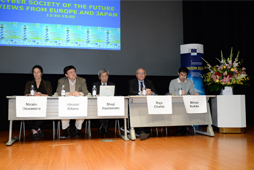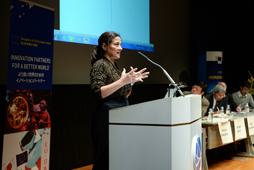We are in the middle of “Cyber Society” that is highly connected by networks. How does cyber society influence the industry? And how does it change human lives? In this keynote session, experts and researchers from Japan and Europe discussed from each standpoint “The Future of Cyber Society: Views of Europe and Japan.”
欧州委員会通信ネットワーク・コンテンツ・技術総局(DG CONNECT)総局長顧問の Nicole Dewandre氏、ソニーコンピュータサイエンス研究所代表取締役社長の北野宏明氏、早稲田大学副総長の橋本周司氏、パリ第6大学教授のRaja Chatila氏、名古屋大学准教授の久木田水生氏、モデレーターにはCNRS北アジア地域事務所所長のPhilippe Codognet氏が登壇しました。。
Nicole Dewandre, advisor for societal issues to the Director General of the Directorate General for Communications, Networks, Content and Technologies (DG CONNECT) at the European Commission; Hiroaki Kitano, president and CEO of Sony Computer Science Laboratories; Shuji Hashimoto, Vice President of Waseda University; Raja Chatila, Director of Research at the French National Center of Scientific Research; Namio Kukita, associate professor at Nagoya University;,and Philippe Codognet, Director of Northern Asia Region Office of Centre National de la Recherche Scientifique (CNRS) as moderator, were on the stage.

私たちの世界は、全ての物や人がネットワークにつながれたサイバー社会へと急速に変わっています。第1部では、Nicole Dewandre氏と北野宏明氏が話題提供し、つながることによる人間と産業への影響を考えました。
Our world has been rapidly changing towards a cyber society where all people and objects are connected by networks. In the first section, Nicole Dewandre and Hiroaki Kitano posed questions and discussed how being connecting affects people and the industry.
Dewandre氏は、サイバー社会の人間への影響を哲学的な見地から語りました。「特に西洋においては、人間は合理的主体と考えられていました。しかし、常にネットワークにつながれた社会では、人間中心に考えることは難しくなります。人間が環境に対して何かをするだけではなく、環境との関係を考えなくてはならないからです」と述べ、人間の定義を作り直し、人間を関係的自己と考える必要があると訴えました。
Dawandre talked about the influence of cyber society on people from a philosophical point of view. “Especially in the West, a human being was considered to be a rational subject. However, in a society where we are always connected by networks, it is difficult to think in a human-centered way. We must think about not just what humans do towards the environment, but also about the relationship between humans and the environment,” says Dawandre. She emphasized the need to change the definition of a human being as a relational self.
サイバー社会の議論では、プライバシーなどの問題がしばしば取り上げられます。 Dewandre氏は、これらは問題の症状であり、「問題の視点を考え直す必要がある」と語りました。もう一度深く考えれば、問題への質問が変わってくるといいます。また、「東と西の考え方が融合することにより、この問題への答えを見つけることができるのではないでしょうか」と期待を示しました。
The problem of privacy often comes up when discussing a cyber society. Dawandre mentioned that these were the symptoms of problems and “we need to rethink about the perspective of how we frame the problem.” She says that by thinking deeply once again, questions to the problem will begin to change. She showed some positive expectation by saying, “integrating the perspectives of the East and the West can lead to finding the solutions to this problem.”
北野氏は、オープン・エネルギー・システムの取り組みを紹介しました。沖縄にある研究施設では、19棟の家々に発電装置と蓄電装置を備え、ネットワークでつなぐことで、互いに電力を融通することができます。これは新しいボトムアップ型の電力供給システムです。一元化された既存のシステムとは異なり、完全に分散化・自律化されています。「電力以外の分野でも、さまざまなシステムが一元化から分散化へと変わりつつあります」と北野氏は語りました。具体例としてYouTubeやAirbnb、Uberが挙げられました。消費者もサービスを提供する時代になり、そのためのサイバーインフラが整備されてきています。
Kitano introduced his approach to the open energy system. In a research facility in Okinawa, 19 houses equipped with electric generators and electrical storage devices can mutually lend electricity by linking them with a network. This is a new bottom-up power supply system. It is completely decentralized and autonomized unlike the centralized existing system. “Many systems in fields outside of electricity are beginning to change from centralization to decentralization,” according to Kitano. Youtube, Airbnb, and Uber were presented as examples. This is the era that consumers also provide services, and the cyber infrastructure is being prepared for that.
北野氏は「全てがつながった社会では、その脆弱性が問題になります」とサイバーインフラのリスクを指摘しました。どこかに問題が起きてもシステムが耐えられる堅牢さが必要とされます。沖縄の施設は、この一年間で一度もダウンしたことがないといいます。
Kitano pointed out the risk of cyber infrastructure, saying, “The vulnerability will be a problem in a society where everything is connected.” The system needs to be secure enough to deal with any problems. The facility in Okinawa has never shut down in the past year according to Kitano.
分散化と自律化は経済も変えると北野氏は語ります。「自律運転電気自動車が実現すれば、エネルギーインフラの一部となります。モバイルバッテリーシステムとなるからです。また、自律であれば所有する必要がなくなり、共有する経済と変わるでしょう」との見通しを示しました。
Decentralization and autonomization will change the economy as well, says Kitano. “If self-driving electric cars are invented, it will be a big part of the energy infrastructure because it will be a mobile battery system. In addition, if it is autonomous, you don’t need to own it and there will be a shift to sharing economy.”

サイバー社会では、ロボット技術の役割も重要です。第2部では、橋本周司氏、Raja Chatila氏、久木田水生氏が話題提供し、サイバー社会におけるロボットと人間との関わりを考えました。 橋本氏は、「本当の『こころ』をもつヒューマンパートナーとしてのロボットを作りたい」との想いから、ロボティクスの研究に取り組んでいます。プログラムで制御して、こころを持っているように見えるロボットを作ったとしても、それは模倣に過ぎません。橋本氏は、「こころを作ることはできなくても、育てることはできます」として、「環境を設計して、学習させることで自我を持つロボットができないかと考えています」との展望を示しました。
In a cyber society, the role of robot technology is very important. In the second section, Shuji Hashimoto, Raja Chatila, and Namio Kukita paused questions and discussed the relationship between humans and robots in a cyber society. Hashimoto has a desire to “build a robot with a true “heart” that will become a partner of humans,” and conducts research on robotics. Building a programmed robot that looks as if it has a heart is just an imitation. Hashimoto says, “it may be impossible to make a heart, but it is possible to grow one,” and “I believe that by designing an environment and making a robot learn, we might be able to make a robot that has an ego.”
アシモフのロボット三原則では、ロボットは必ず人間に従うとされています。しかし、これでは「本当のヒューマンパートナーはできない」と橋本氏はいいます。「設計したプログラム通りに動くかではなく、環境から自発的にできたものを享受することが必要でしょう」と人間の子供が育つのを見守るような姿勢が大事であると語りました。
According to Asimov's Laws, robots always obey humans. However, “this isn’t a real human partner”, claims Hashimoto. “It is necessary to accept what’s spontaneously created from the environment instead of making sure that robots operate as programmed,” said Hashimoto.
こころを持つロボットが実現した社会を考えるとき、「ヒューマニズムを超えて、我々に何ができるかを考えなくてはなりません」と橋本氏は指摘。最後に、「未来は見えないけれども、工学は未来を作ることができます」と締めくくりました。
Hashimoto also pointed out that when imagining a society with robots with true hearts, “we need to think about what we can do beyond humanism.” Finally, he concludes, “We can’t see the future, but engineering can build the future.”
橋本氏には、「子供を育てるときとロボットを育てるときの違いは何か」との質問がありました。橋下氏は、環境を作って、育つのを見守るという点では同じであるとしました。ただ、長い目で見たとき、ロボットが変わって、人間だけが変わらないと考えるのは非常に危険であり、ともに変わるということを忘れてはならないと指摘しました。
The following question was asked to Hashimoto: “What is the difference between raising a child and a robot?” Hashimoto replied that building an environment and watching them grow the same. However in a long run, thinking that robots will change while humans won’t is very dangerous; You should not forget the fact that they both change.
Chatila氏は、人間とロボットの類似性について考えました。ロボット技術が進み、機能的にはロボットは人間へと近づきつつあります。では、人間とロボットの差は何なのでしょうか。Chatila氏は、ロボットの研究者として、その質問への答えを持たなければならないといいます。
Chatila discussed the similarities between humans and robots. As robot technology advances, robot functionalities are getting closer to humans. Then what is the difference between the two? Chatila thinks that he needs to have the answer to this question as a researcher specializing in robots.
哲学者のハンナ・アレントが著した『人間の条件』では、人間の条件の一つとして、コミュニケーションを挙げています。Chatila氏は、「コミュニケーションが人間の存在そのものを説明します。これが、人間とロボットの違いを生み出す鍵となります」といいます。
According to “The Human Condition” by philosopher Hannah Arendt, communication is a part of the human condition. Chatila explained, “Communication explains the existence of humans themselves. This is the key that makes humans and robots different.”
外見上、ロボットは人間にどんどん近くなってきています。特に、情報を持たない市民や子供の目には、それらを区別することが難しくなります。ロボティクスの倫理的研究の結論として、「曖昧になる人間とロボットの境界に対して、その危機に警鐘を鳴らし、それによる混乱を解く必要があります」とChatila氏は訴えました。
Visually, robots look more and more like humans. Especially to the eyes of citizens and children who are not well informed, it will be hard to distinguish. As a conclusion of ethical research on robotics, “we need to address that the boundary between humans and robots is becoming unclear, and resolve the confusion caused by it,” said Chatila.
Chatila氏には、「ヒューマノイドを作る意義は何か」という質問が寄せられました。 Chatila氏は、その意義は2つあるといいます。一つは、作ることによって理解したいという工学的な視点。もう一つは、「ピグマリオンの神話」を引き合いに出して、人間に似た存在を構築したいという神のような視点であるとしました。
The following questions were asked to Chatila: “What is the significance of creating a humanoid?” Chatila thinks that there are two kinds of significance. The first is the engineering aspect of building it to understand it. The second one is the God-like aspect of building a human-like existence, just like the story of Pygmalion.
モデレーターのPhilippe Codognet氏は、西洋では神が重要な役割を果たすと指摘。ヒューマノイドを作ろうとしたときに、ロボット倫理委員会の研究者が脅迫を受けたというエピソードを紹介しました。西洋のキリスト教の伝統に照らせば、人間が神の役割を担おうとしているのは、受け入れられないという見方もあるようです。
The moderator, Philippe Codognet, pointed out that God plays a critical role in the West. He introduced an episode that a researcher of the Robot Ethics Committee received a threat when they tried to create a humanoid. There is a view that the idea of humans playing God’s role is not allowed in Christianity.
久木田氏は、媒介メディアとしてのロボットの役割に注目しました。人間は、テクノロジーを介して世界を認識して働きかけるため、テクノロジーが変化すれば人間と他者との関係性も変わると久木田氏は語りました。「もし、自律的に情報を集めて、処理し、それを行動に結びつけてくれるロボットがあれば、私たちは世界について知らずに済み、人間と他者との心理的な距離を広げてしまう可能性があります」として、「心理的な距離が大きいほど、他者への共感が減るとすれば、社会に対して持つ責任の意識が損なわれてしまいます」と危惧しました。
Kukita focused on the robots’ role as a medium. Kubota said that if technology is changed, the relationship between a person and others would change because humans would recognize and approach to the world through technology. “If a robot can autonomously collect and analyze data, and link it with actions, we won’t need to know the world, and this could potentially widen the psychological distance between a person and others,” and “if the psychological distant gets wider and empathy towards others gets less, no one will take responsibilities for the society,” said Kukita concerning such risk.
久木田氏は、映画『メトロポリス』の「頭と手を媒介するものは心でなければならない」というせりふを紹介。「テクノロジーが人々を分断するのではなく、人々を強く結びつけるものであってほしい。そして、テクノロジーが、作った人間や使う人間の心を反映するものであってほしいと願っています」と訴えました。
Kukita introduced a line from the movie Metropolis; “The mediator between head and hands must be the heart.” He expressed his hope: “Technology should not be something that divides people but something that strongly ties them together. Furthermore, I wish that technology reflects the hearts of people who made or use it.”
「西洋には、共感の問題は直感に頼ればいいという歪んだ理解があります。自由に競争して自分の利益を追求すれば、うまくいくという考え方が前提になっているのです」としたDewandre氏に対して、久木田氏は「社会を支えている前提は、テクノロジーによって切り崩されつつあります。その中で、我々はどういった社会を実現していくのかを考えるべきです」と答えました。
“In the West, there is a biased view that you can use your intuition to have empathy. This is based on the premise that things work out by competing freely and seeking your own profit and benefit,” says Dewandre. Kukita responded, “Technology is beginning to break down the premises that support the society. Meanwhile, we need to think about what kind of society we create.”
最後に、モデレーターのCodognet氏が「自然を支配しようとする人間の横柄さが、大きな間違いだ」という映画「ゴジラ」のせりふを引用しました。「サイバー社会、ロボティクス、気候の問題も全て含めて、その誤解の元で起こっているかもしれません。ヒューマニズムを超えて、もう一度考える必要がありそうです。今回のセッションが、みなさんの考えるきっかけになればと思います」として、セッションを終えました。
Finally, moderator Codognet shared a quote from the movie “Godzilla”: “The arrogance of men is thinking that nature is in our control, and not the other way around.” He concluded the session by saying, “Cyber society, robotics, climate problems, and everything else could all be happening because of this misconception. We need to rethink about it beyond humanism. I hope this session was a good opportunity for everyone to think about this topic.”
サイバー技術は人々をつなぐと考えてきました。しかし、今回のセッションでは、その扱いを誤れば人々を分断する危うさもあると感じました。サイバー技術は急速に進み、実際に生活を変えつつあります。社会での議論が不十分では、見えないところで許容できない変化が生じるかもしれません。社会の進むべき方向性を決めるのは私たちです。社会全体が、そして私たち個人が、この問題についてしっかりと考える必要があると思いました。(遠藤智之)
I have been thinking that cyber technology links people together. However in this session, I understood that the misuse of it could lead to a division of people. Cyber technology is rapidly growing and has changed our daily lives. If the topic is not adequately discussed in the society, we might face the invisible change that we cannot accept. We are the ones who decide where the society should head to. The whole society and each of us needs to think thoroughly about this problem. (Tomoyuki Endo)